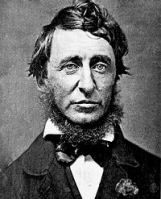| 亨利·大衛·梭羅 | |||||||
阅读亨利·戴維·梭羅 Henry David Thoreau在散文天地的作品!!! 阅读亨利·戴維·梭羅 Henry David Thoreau在百家争鸣的作品!!! | |||||||
1845 年 7 月 4 日 梭羅開始一項為期兩年的試驗,他移居到離家乡康科德城(Concord)不遠,優美的瓦爾登湖畔的次生林,嘗試過一種簡單的隱居生活。他於1847年9月 6日離開瓦爾登湖,重新和住在康科德城的他的朋友兼導師拉爾夫·沃爾多·愛默生一生活在一起。出版於1854年的散文集《瓦爾登湖》詳細記載他在瓦爾登湖畔兩年又兩個月的生涯。雖畢業於世界聞名的哈佛大學,但他沒有選擇經商財或者從政成為明星,而是平靜地選擇瓦爾登湖,選擇心靈的自由和閑適。他搭起木屋,開荒地,寫作看書,過着非常簡、原始的生活。
Thoreau's books, articles, essays, journals, and poetry total over 20 volumes. Among his lasting contributions were his writings on natural history and philosophy, where he anticipated the methods and findings of ecology and environmental history, two sources of modern day environmentalism. His literary style interweaves close natural observation, personal experience, pointed rhetoric, symbolic meanings, and historical lore; while displaying a poetic sensibility, philosophical austerity, and "Yankee" love of practical detail. He was also deeply interested in the idea of survival in the face of hostile elements, historical change, and natural decay; at the same time imploring one to abandon waste and illusion in order to discover life's true essential needs.
He was a lifelong abolitionist, delivering lectures that attacked the Fugitive Slave Law while praising the writings of Wendell Phillips and defending abolitionist John Brown. Thoreau's philosophy of civil disobedience influenced the political thoughts and actions of such later figures as Leo Tolstoy, Mahatma Gandhi, and Martin Luther King, Jr.
Thoreau is sometimes cited as an individualist anarchist. Though Civil Disobedience calls for improving rather than abolishing government – "I ask for, not at once no government, but at once a better government" – the direction of this improvement aims at anarchism: "'That government is best which governs not at all;' and when men are prepared for it, that will be the kind of government which they will have."
